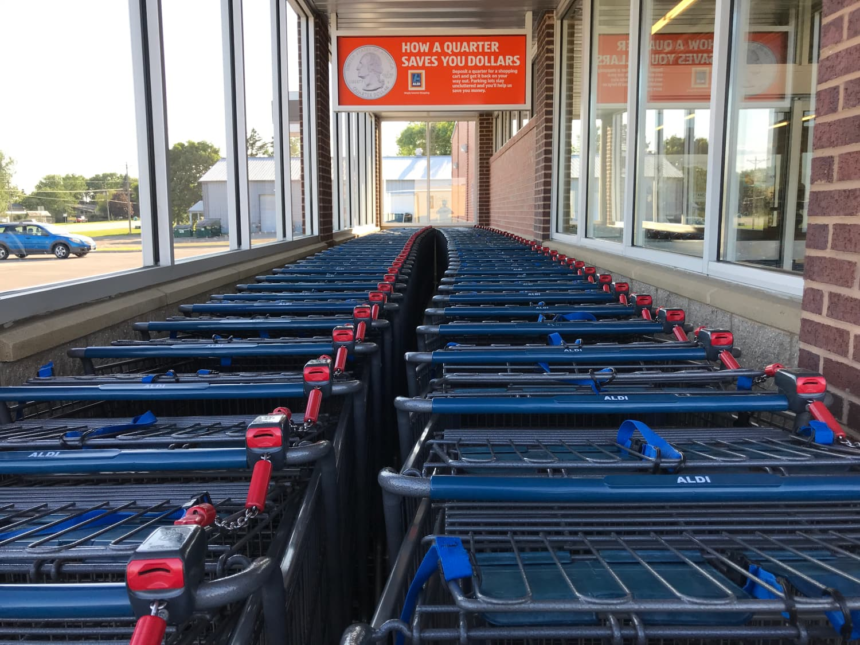Aldi, a popular European store, arrived in the U.S. in 2017. They introduced new products to the U.S., but also had a rule that confused first-time customers. Customers had to pay to use Aldi’s shopping carts.
Aldi, a German grocery store chain, requires customers to pay for using their shopping carts. There are a few reasons for this rule.
Firstly, Aldi is known for offering high-quality products at low prices. To maintain this reputation, they cut costs in other areas. For instance, if customers return their own shopping carts, the company doesn’t have to hire someone separately for that job.
Secondly, Europeans are less concerned about shopping carts compared to Americans. Since Aldi is a European chain, they may not prioritize carts as much. In fact, many European countries use “coin-release” carts. For example, Italians often don’t use carts at all, which shows that Americans are more likely to use them. One reason for this could be the difference in home sizes between Europe and the U.S.
Europe has a long history, so homes are older and generally smaller. As a result, standard-sized appliances like refrigerators or pantries are also smaller. This means people don’t buy as much at once. On the other hand, Americans tend to have larger kitchens with more space and often buy in bulk from stores like Costco or Sam’s Club.
To deter theft, Aldi’s requires customers to pay for using their shopping carts. This measure not only saves the company money but also benefits its customers. The theft of shopping carts has become increasingly common in the US, especially with the rise in homelessness. However, replacing stolen carts can be costly for businesses, ranging from $75 to $250 per cart. Numerous stores have suffered significant losses due to this issue.
Aldi shopping carts can be used by paying a deposit of a quarter. The good news is that the quarter is given back to the user when the cart is returned. Customers pay a refundable and affordable deposit to rent the shopping carts. This system unintentionally helps in maintaining the parking lots as well. When the carts are returned and placed in their designated areas, they don’t block parking spots or roll around in the wind, potentially causing damage to parked cars. So, even though the rule may seem inconvenient, the advantages outweigh the disadvantages.
Michael Roberto attributes the large number of people who willingly pay a quarter to use a shopping cart and then return it themselves to “basic human psychology.” It seems that Aldi’s customers, who are mindful of their budget, prefer not to pay for something that should be available for free. On the other hand, there are studies that indicate that a cart rental system similar to Aldi’s might not be effective. It appears that there are individuals who are willing to pay a quarter to “purchase” a cart that they can keep.
As theft continues to increase in the US, many stores are taking steps to reduce or discourage theft. For instance, instead of charging customers for using shopping carts like Aldi does, stores like Target have installed a lock mechanism on the wheels. This mechanism automatically locks the carts when they are too far away from the parking lot, store entrances, or shopping cart corrals.
In addition to shopping cart theft, stores are also experiencing an increase in merchandise theft. To address this issue, many stores have started locking up certain products and requiring assistance from staff members. For example, Home Depot and similar stores have locked up expensive items like power tools, while Walmart and Target have locked up products such as laundry soap and cosmetics that are frequently stolen. Retail stores are actively trying to find solutions to the $95 billion shoplifting problem. Some stores have increased security measures by installing cameras in different aisles or hiring security guards. In some cases, they have even hired military personnel. At the same time, there is a rise in the use of “lot cops,” which are speakers that notify everyone in the vicinity that the area is being monitored.
It’s a small fee to use Aldi’s shopping carts, but you can get your money back when you return them. Arguing about this is unnecessary because it’s a basic skill to clean up after ourselves and put things back. Aldi may not be widely recognized in the US, but there are over 2,000 stores across the country. If you’re curious about finding one nearby, they have a store locator.
